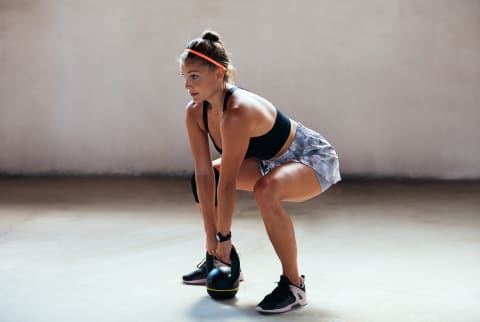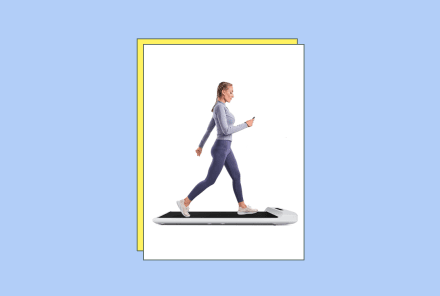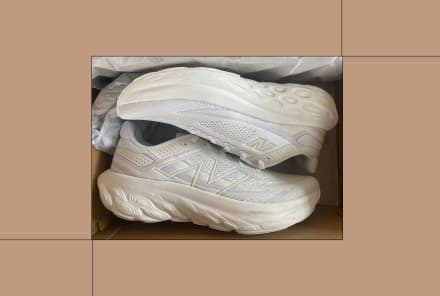Advertisement
Why Exercise Is Making You Hangry + 3 Ways To Stop It


Most can agree that exercise is healthy and good for you; however, many women find themselves somewhere between feeling guilty that they can't make time for regular exercise and overdoing it entirely—and creating a lot of hormone haywire in the process. Whether that's because it's new and not yet a regular habit or because their current exercise plan is creating an imbalance in their hormones, many women struggle with the uptick in appetite and cravings that can be triggered by their workouts.
Why is it so hard for women to get it right when it comes to exercise?
Exercise is powerful medicine, and women struggle to use it to heal and support their hormones instead of wrecking them partly because the type and dose that's right for one woman may be the exact thing that doesn't work at all for her girlfriend or her sister.
Many women also haven't been taught how to listen to their own hormonal talk: the clues our hormones give us all day tell us how they are doing with our current diet, lifestyle, and workout style. Instead of heeding their hormonal messages, they keep going—or worse, they double down on exercise that isn't working, assuming something is wrong with them, that they need to try harder, #beastmode, #noexcuses, or other nonsense that makes women think it's their fault. So they trudge ahead; they keep going, and with that they drive their hormones into further disarray.
Exercise is a stress on our hormonal system and metabolism, and we can harness that for favorable change to our health and body composition, or it can become just another stress on our already overburdened system, and in some cases, it can backfire entirely by causing weight gain that can be due to an increase in appetite after we've upped our exercise.
Appropriate testing is an incredibly useful tool to see how your hormones are doing; however, knowing how to make sense of the cues that you get from your hormones every day can be super useful—and empowering especially when it comes to knowing whether your current exercise regimen is working for your hormones.
- If your appetite is on the rise, your cravings for sugar, starches, or fatty foods have shot up; your energy has taken a downward dip; or you are now having more trouble falling or staying asleep after you've changed your exercise program or you've had a recent increase in intensity or volume of exercise, that new workout may be to blame.
- Changes in sleep and energy may be directly related to cortisol responses from an increase in exercise. Appetite and craving changes are a bit more interesting as they can be in response to cortisol as well or due to fluctuations in other hormones that dictate appetite such as ghrelin and leptin.
- Ghrelin is produced in your stomach and is your hour-to-hour hunger hormone. When it's elevated, you'll be more hungry and often for highly palatable foods1 like those sweet, fatty, or salty starches also ramped up with cortisol. Leptin, on the other hand, is more of a gas-gauge-type hormone, regulating hunger on a larger scale vs. the more immediate response of ghrelin.
- Leptin is made by your fat cells, and as it rises, hunger should be turned off and your thyroid and adrenals are triggered to boost metabolism. However, constantly elevated levels of leptin will actually increase hunger and slow metabolism known as leptin resistance. Leptin and ghrelin are affected by exercise2 and will play a role in how your appetite changes from your workouts.
All of these effects will vary depending in part on the total stress load you're already under and how your cortisol response is already faring, how leptin-resistant or sensitive you are, and whether your thyroid hormones are adequate, whether you have more body fat vs. less, and whether you're a longtime gym rat or you are new to training. The type of exercise will also significantly affect how hangry exercise makes you.
Solution #1: Less-intense cardio exercise.
There are certain exercises such as walking that tend to be hormonally balancing3 without causing excessive cortisol release and subsequent uptick in appetite and cravings4. I recommend five walks per week, outdoors if possible, for 45 to 60 minutes.
Research also shows that walking makes us happier5, and when we've got more happy-making brain chemicals around like dopamine, we seek out less comfort food or alcohol6 to make ourselves feel better and boost our mood.
I've found that except for the most worn-out women, except perhaps those struggling with a low thyroid autoimmunity or a lot of inflammation, can tolerate walking. If they can't walk for very long without signs of overdoing it, I suggest starting with 10 to 15 minutes instead of 45 and increasing by a couple of minutes every few days or every week until they tolerate it better.
Solution #2: More intense, shorter bursts of exercise.
More intense, shorter exercise sessions tend to suppress ghrelin and thus appetite7 even though they do stimulate cortisol. So if you are not suffering from HPA-axis dysfunction (commonly called adrenal fatigue), are overly inflamed, or are hypothyroid, this may be your best bet for exercise.
Activities like sprinting or metabolic conditioning with weights fit the bill, but, again, be sure you watch for lower energy or disruptions in sleep because while this holds true in the research, again, many women's hormones are not in a good place and they don't respond in this predicated manner—or they do for a bit and then when things change, they need to tune back in and adjust. Women's hormones are frequently in a state of flux, and we have to repeatedly check in on how the current plan is working remembering that what worked before for us may not work now, and what's working now may not work in a few months or years.
Solution #3: Heavier weight training.
Lifting heavier weights (fewer reps, i.e., five sets of five reps, with plenty of rest and focusing on complex movements like squats, deadlifts, overhead press, etc.) is almost always a win in my book as it improves lean mass (thus improving metabolism and insulin sensitivity8 over the long haul), imparts strength not only for daily living, but with fewer injuries, longevity, and autonomy as we age, but it also can be a way to harness the power of strength training without putting the heat on your cortisol response.
However, many women see a normal or suppressed appetite the day of lifting but find themselves with an increased appetite the day after a heavier strength-training session. Fueling with adequate protein and carbs to your UCT (unique carb tolerance) or by using branch-chain amino acids, especially in the post-workout window, can be really helpful.
Remember: It may be in your head.
We can't forget the mindset trick we sometimes play on ourselves after a hard workout. You know what I mean if you've ever caught yourself saying, I've worked so hard, I've earned it! This can have us indulging in treats or excess calories because we feel we've offset it with the exercise we've just done.
Exercise is an important aspect of our health, but when it comes to weight loss, research has continually shown us9 that focusing on diet and nutrition helps expedite the process more than exercise does (the best results come when you do them in tandem). So the idea that we can work it off at the gym is something many of us believe but one we should work to let go of as it doesn't serve us well most of the time.
And remember that there’s still a whole lot we do not understand about the human metabolism and especially about more nuanced and dynamic factors that influence behavior, appetite, and hormones such as our gut microbiome. As well, we always want to filter advice and research through a curious lens as we try to apply that to ourselves, our current hormone landscape, and our goals.
To wrap up this long biochemical story, it's easy to be working at cross-purposes with our diet and exercise if our current plan is spurring our appetite and cravings, tanking our energy, and wrecking our sleep. Your best course of action is to be your best friend and listen to your hormonal cues from insulin, cortisol, leptin, and ghrelin as they are telling you in real time how they're doing. The problem is most of us either don't know how to tune in and decipher those messages, or our unhelpful self-talk tells us to keep going, to dig in deeper despite the signals that our hormones are hating this plan. So listen to your hormones talking—they have really important info for you.
9 Sources
- https://www.ncbi.nlm.nih.gov/pubmed/18987287
- https://www.ncbi.nlm.nih.gov/pubmed/11939485
- https://www.ncbi.nlm.nih.gov/pubmed/19568835
- https://www.ncbi.nlm.nih.gov/pubmed/20674640
- https://www.ncbi.nlm.nih.gov/pmc/articles/PMC3746773/
- https://www.ncbi.nlm.nih.gov/pmc/articles/PMC3124340/
- https://www.ncbi.nlm.nih.gov/pmc/articles/PMC3761859/
- https://www.ncbi.nlm.nih.gov/pubmed/15628572
- https://journals.plos.org/plosone/article?id=10.1371/journal.pone.0040503
Watch Next
Enjoy some of our favorite clips from classes
Enjoy some of our favorite clips from classes
What Is Meditation?
Mindfulness/Spirituality | Light Watkins
Box Breathing
Mindfulness/Spirituality | Gwen Dittmar
What Breathwork Can Address
Mindfulness/Spirituality | Gwen Dittmar
The 8 Limbs of Yoga - What is Asana?
Yoga | Caley Alyssa
Two Standing Postures to Open Up Tight Hips
Yoga | Caley Alyssa
How Plants Can Optimize Athletic Performance
Nutrition | Rich Roll
What to Eat Before a Workout
Nutrition | Rich Roll
How Ayurveda Helps Us Navigate Modern Life
Nutrition | Sahara Rose
Messages About Love & Relationships
Love & Relationships | Esther Perel
Love Languages
Love & Relationships | Esther Perel











